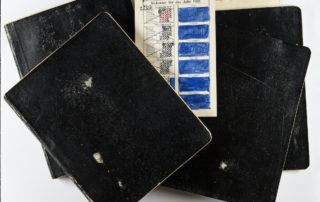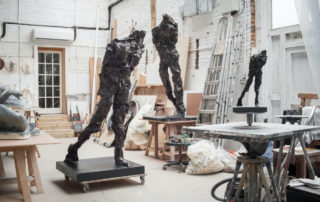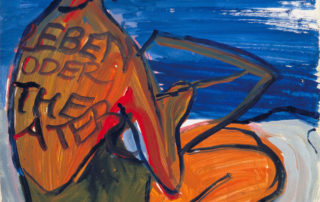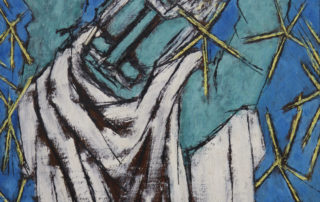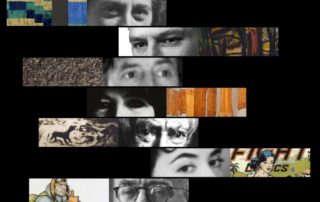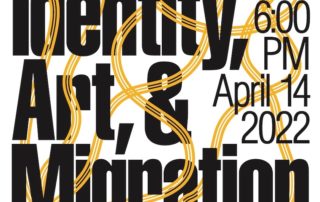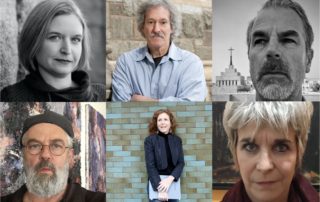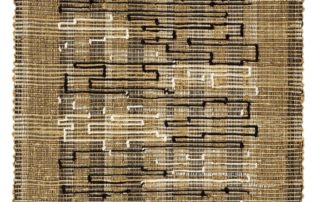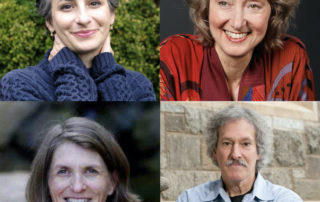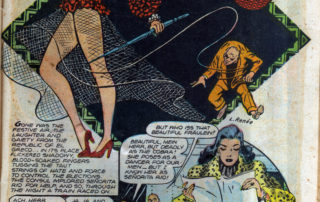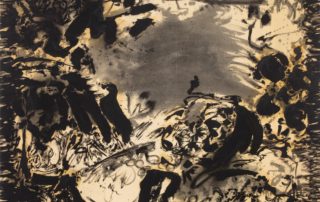Rachel Stern2022-05-04T15:26:49-04:00April 11th, 2022|Events, Lectures, Past Events|
On October 26, 1933, Hans Uhlmann was arrested by the Gestapo on the street. In the notorious Columbia-Haus, he was interrogated for several weeks and then found guilty by the court of appeal of “preparations for a traitorous enterprise.” He spent a year and a half in prison—first in Moabit and then in Tegel Prison. The artist recorded his experiences of those years in diaries. In parallel with these diaries, he produced four books of sketches. In his diary entries Uhlmann describes his arrest as well as scenes from daily life in confinement but above all his artistic concerns and projects: “I think often of freedom; of my first works; I occupy myself here by imagining these figures” (May [...]
Rachel Stern2022-09-07T15:52:51-04:00March 28th, 2022|Events, Lectures, Past Events|
Maurice Blik has lived in England since being liberated from Bergen Belsen concentration camp, where he was taken as a small child from his birthplace, Amsterdam. The ability to come to terms with this experience and to confront the face of humanity that he has witnessed, stayed silent in his life for some 40 years. It finally found a voice in the passionate sculptures which began to emerge in the late 1970s when he created a series of horses’ heads. These noble and benevolent creatures posses an energy and a life force that seem just barely harnessed long enough to take their shape in the clay itself. Later he progressed to more figurative work in which the irrepressible joy [...]
Rachel Stern2022-06-07T11:49:44-04:00February 13th, 2022|Events, Lectures, Past Events|
Charlotte Salomon (1917-1943), was a hugely talented Berlin-born artist who was murdered at Auschwitz, four months pregnant, at the age of twenty-six. Her main body of work, a sequence of nearly 800 gouache images entitled Leben? oder Theater? (Life? or Theatre?), and created while seeking refuge in the South of France, is an ambitious fictive autobiography which deploys both images and text, and a wide range of musical, literary and cinematic references. The narrative, informed by Salomon's experiences as a cultured, and assimilated German Jewish woman, depicts a life lived in the shadow of Nazi persecution and a family history of suicide, but also reveals moments of intense happiness and hope. Challenging the artistic conventions of Salomon’s time, it remains [...]
Rachel Stern2022-04-06T15:57:51-04:00January 21st, 2022|Events, Lectures, Past Events|
Born in the Russian Empire, Ben-Zion (Benzion Weinman, 1897-1987) immigrated to New York City between the wars, arriving as a craftsman of words whose cultural Zionist convictions led him to write his poetry in Hebrew. By the early 1930s, the rise of fascism and its particularized manipulations of language drove him to despair of the power of words and to turn to visual art as a medium of expression. Endlessly creative, across the next six decades he produced a flood of drawings and oil paintings and sculptures often made by re-visioning found objects of wood, stone, and iron. As a founding member of the expressionist group, "The Ten"--that included among others a young Mark Rothko--Ben-Zion addressed social, political, and cultural [...]
Rachel Stern2025-11-07T07:22:00-05:00January 19th, 2022|
“Identity, Art and Migration” investigates the experience of eight Jewish European artists who were forced to abandon their country of origin, or remain in hiding for years, in response to Nazi policies in effect from 1933 to 1945. These six artists: Anni Albers, Friedel Dzubas, Eva Hesse, Rudi Lesser, Lily Renée and Arthur Szyk emigrated to the United States, while one, Fritz Ascher, stayed behind in Germany, hiding in a basement for three years. These artists’ lives and work address the multi-layered concept of identity and the particulars of its expression from slightly different angles. We invite you to explore with us how these wrenching experiences affected their sense of who they were, and the art they made. [...]
Rachel Stern2022-05-02T14:41:57-04:00January 12th, 2022|Events, Past Events|
Note: Attendees must provide proof of vaccination (including booster, if eligible) and advance Eventbrite registration. Presented by BFA Visual & Critical Studies, the SVA Honors Program, and The Fritz Ascher Society for Persecuted, Ostracized, and Banned Art. In honor of The Fritz Ascher Society for Persecuted, Ostracized and Banned Art's virtual exhibition “Identity, Art and Migration,” this panel discussion probes historical and all-too contemporary fault lines of persecution, migration, intolerance, cultural complexity and art. Historians, curators and artists come together to discuss the life and work of artists who were persecuted by the German Nazi regime and came to the US during the first half of the 20th century, while also hearing from living artists who are facing the challenge of relocation [...]
Rachel Stern2022-03-28T19:23:45-04:00January 5th, 2022|Events, Past Events|
Opening remarks by Consul Yasemin Pamuk, Consulate General of the Federal Republic of Germany in New York Distinguished Panelists Ori Z Soltes PhD, Georgetown University in Washington DC Artist Refugees from Nazi Germany in the United States Rebecca Erbelding PhD, Historian and Author in Washington DC US Immigration Policy during the 1930s Refugee Crisis Stephen M Rasche JD, Catholic University in Erbil, Kurdistan Region, Iraq Identity in a Time of Forced Displacement: Religious Art and the Iraqi Christian Experience David Stern, German born American Artist in New York NY Immigration and Culture Shock in Times of Globalization Musical Performance (Piano) Carolyn Enger, Steinway Recording Artist: Arnold Schoenberg - Sechs kleine Klavierstücke Op. 19 Emahoy Tsegué-Maryam Guèbrou: Homesickness Pt. 1 Paul [...]
Rachel Stern2022-03-02T19:19:46-05:00December 31st, 2021|Events, Lectures, Past Events|
In the late nineteenth century, the sculptor Joseph M. Abbo (1888–1953) – who later renamed himself Jussuf Abbo – was born in Safed, in the province of Beirut of the Ottoman Empire. As a young man, he began working as a labourer on the restoration site being led by an architect, Hoffmann, on behalf of the German government. Abbo was noticed and was rapidly promoted to the drawing-office and to stone-carving. He was offered a scholarship at the Berlin School of Art. Jussuf Abbo arrived in Germany in 1911 and began studying at the Royal Academy of Fine Arts in Berlin in 1913. By 1919 he had a master studio in the Prussian Academy of Fine Arts. Throughout the [...]
Rachel Stern2022-08-26T05:17:58-04:00October 14th, 2021|Events, Lectures, Past Events|
Anni Albers (Berlin 1899 – 1994 Orange, CT) found her artistic identity at the renowned Bauhaus--but not where she expected to. The gender-restrictive conditions at the school pushed her to textile work. As the Nazis forced the Bauhaus closure, Anni and her already well-known husband, Joseph Albers, immigrated to the United States, where Joseph and later Anni were invited to teach at Black Mountain College in North Carolina. From there to New York and Yale University, while her husband gained renown as a teacher and practitioner of painting, Anni expanded her presence as an innovator in diverse textile media and styles, shaping a far-flung, influential career that resonates to this day. The United States presented Albers with new [...]
Rachel Stern2022-08-26T05:12:16-04:00October 14th, 2021|Events, Lectures, Past Events|
What is it that defines human identity? DNA? Language? Culture? Landscape? Polity? Or is it a combination of all of these factors? How do the sources of identity make it easy or difficult for individuals who migrate from one location to another—by choice or under duress—not merely to adapt but to become fully comfortable within their new home? In this brief Zoom Conference, an interdisciplinary panel of experts considers how identity is shaped by our genomic make-up; how it is affected by the migration from home to new and different dwelling places; and how, in particular, migrational shifts can affect artists and their creative process. Expert Panel: Libby Copeland, Award-winning journalist and author Ori Z Soltes, Teaching Professor at Georgetown [...]
Rachel Stern2022-09-01T07:14:59-04:00October 10th, 2021|Events, Lectures, Past Events|
Lily Renee arrived during the Holocaust in New York City as a teenager, and somehow found work in the male-dominated comic book world. By the time of her retirement, she had become a legend and her heroic female characters--like Lily herself, smashing through the glass ceiling of gender expectation--and shaping figures that would inspire several generations of young readers, both girls and boys, to rethink the norms that so often otherwise surrounded them. Image above: Lily Renée, Senorita Rio, Fight Comics, Fiction House, not dated. Trina Robbins collection. Lily Renée, Lily Renée, The Werewolf Hunter, Fiction House, not dated (probably 1948). Trina Robbins collection © Lily Renée Lily Renée, The [...]
Rachel Stern2022-08-26T05:20:00-04:00October 8th, 2021|Events, Lectures, Past Events|
In a prolific career that spanned nearly five decades, Friedel Dzubas (b. Berlin, 1915–d. 1994, Newton, Mass.) articulated his mature style by the 1970s, creating a striking visual language from counterpoised abstract shapes of brushed color that he juxtaposed, overlapped, and opened to reveal his gessoed grounds. Yet, in prior years, Dzubas’s early work in Berlin were influenced by Expressionist artist of the two primary groups known as Die Brücke and Die Blaue Reiter. As Dzubas told curator Charles Millard in 1982, “Their unheard-of brashness of color; that was really brave. That was very exciting. Color’s an emotional thing. These people not only spoke directly; they felt deeply. There was passion.” His early pen and ink watercolors embed the [...]


